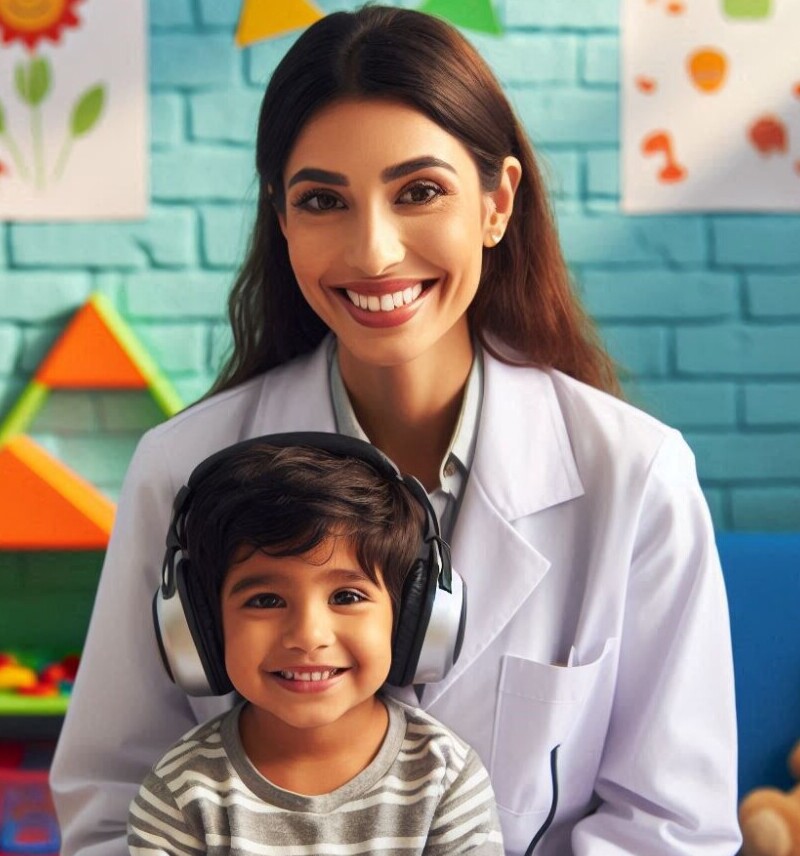The role of pediatric audiologists has grown as our understanding of child development and hearing health evolves.
Pediatric audiologists work with children from infancy through adolescence to diagnose, treat, and manage hearing issues.
Their support plays an important part in a child’s overall development, from speech to social interactions.
These professionals are not only experts in hearing evaluation but also help families understand how hearing impacts daily life.
They spend time clarifying common questions and working closely with caregivers to ensure that every child has the best possible start in life.
Key Areas of Work for Pediatric Audiologists
Pediatric audiologists bring a unique combination of skills to healthcare by working closely with children and their families.
Their work extends from detailed hearing tests to ongoing management of hearing aids and auditory devices.

They also become a reliable source of guidance for parents, teachers, and other healthcare providers. Understanding their role involves recognizing their expertise in evaluating hearing through playful, child-friendly methods and techniques that make the experience enjoyable and stress-free.
These specialists not only run diagnostic tests but also counsel families on how hearing problems can affect learning and social development.
Advances in technology have allowed pediatric audiologists to use innovative diagnostic tools that are both engaging and efficient for children. Their work remains patient-focused, ensuring that the experience is as comfortable as possible for the young ones while also being thorough in its assessment.
This area of healthcare has gone to the next stage steadily over the years, offering specialized services that include newborn hearing screenings and early interventions.
It creates a vital bridge between early detection and timely care, helping prevent delays in language and cognitive development and ensuring that every child’s unique needs are met.
Kickstarting the Adventure to Effective Pediatric Hearing Care
Before a child receives treatment for hearing issues, there are several thoughtful steps to ensure that the process is smooth and effective.
Early diagnosis sits at the center of pediatric audiology care.
This critical first step includes a thorough analysis of a child’s hearing capabilities using non-invasive tests specifically designed for little ears.
During an initial consultation, families are introduced to a range of all-in-one services.
Pediatric audiologists explain the testing methods, what to expect during diagnosis, and the potential treatment options available. These early discussions help ease anxieties families might have, reassuring them that quality care begins with clear communication and understanding.
The entire process is marked by a child-friendly approach.
Clinics are set up with bright, inviting decor and playful equipment that minimizes fear and builds trust. This environment, combined with carefully explained procedures, helps children feel more comfortable and open during their evaluations.
Additional support is provided through follow-up resources which include educational materials and easy-to-understand guides on what to expect as the child progresses.
This ongoing conversation between families and pediatric audiologists ensures that strategies are continually adjusted to meet a child’s evolving needs.
Recommended Reading: How To Understand Hearing Tests Results
Quick Guide to A Typical Pediatric Audiology Service
Getting started with pediatric audiology involves several practical steps to ensure your child receives the care they need.
The following guide outlines a clear process:
- Choose a Specialized Practitioner: Look for audiologists with focused training in pediatric care who truly understand the nuances of working with children.
- Understand the Diagnostic Process: Familiarize yourself with tests such as auditory brainstem responses and otoacoustic emissions, which are specifically tailored for assessing hearing in youngsters.
- Engage in Open Communication: Ask questions about the procedures and be sure both you and your child feel comfortable with the process.
- Encourage a Family-Centered Approach: Pediatric audiologists often include family members in consultations to build a solid support network for the child.
- Follow-Up Consistently: Regular check-ups are very important to monitor progress and adjust treatment plans as needed over time.
Taking these steps can help build confidence among families, ensuring a proactive and comforting approach to managing a child’s hearing care and overall development.
Challenges and Considerations in Pediatric Audiology
While pediatric audiologists strive to create a smooth diagnostic and treatment process, there are several challenges to consider.
The specialized nature of pediatric care means that unique issues often arise that demand thoughtful solutions.
One area of concern is the maintenance and calibration of specialized audiological equipment.
Testing devices need regular updates and rigorous checks to deliver accurate results. This is crucial for ensuring that each test reflects a child’s true hearing capability and informs the proper treatment plan.
Another consideration is the natural anxiety that children may experience during medical evaluations.
Pediatric audiologists often use creative and interactive techniques to help relax children, transforming what could be a stressful situation into an engaging and positive experience. These approaches not only soothe fears but also improve the reliability of the test results.
Parental concerns also play a very important role throughout the process. Many parents worry about the long-term implications of hearing issues.
Pediatric audiologists take extra time to clearly explain the steps involved in care and how early intervention leads to significant, positive outcomes. They frequently work hand-in-hand with other specialists to create an all-in-one care plan that holistically addresses the child’s needs.
- Equipment Calibration: Routine checks of audiological equipment are essential for obtaining accurate diagnoses.
- Child Comfort: Establishing a welcoming testing environment helps children relax and gives more reliable test results.
- Parental Involvement: Keeping an eye out for family concerns and ensuring constant communication builds trust in the treatment process.
- Regulatory Considerations: Staying current with health regulations and insurance guidelines makes managing care smoother and more efficient.
Recommended Reading: Identifying Early Signs Of Hearing Loss In Children
Advanced Strategies and Best Practices
Once the basics of pediatric audiology are in place, advanced strategies can further step up the care provided.
These approaches focus on integrating new technologies, refining testing methods, and stepping up follow-up services to foster a more effective treatment experience.
Integrate Innovative Diagnostic Tools: New testing devices and software can offer faster and more accurate assessments, providing a clearer basis for planning treatments. These tools are constantly updated to align with the latest in scientific research, ensuring that every assessment is precise and timely.
Step-Up Communication Techniques: Ongoing training in child interaction equips audiologists to better understand and connect with young patients. This improved communication creates a supportive atmosphere, which is crucial during examinations and helps reduce any distress a child might feel.
Interdisciplinary Collaboration: Teaming up with speech therapists and other specialists establishes an all-in-one care model. This collaboration is very important because it ensures that every aspect of a child’s hearing and speech development is carefully monitored and addressed.
Personalized Follow-Up Programs: Custom follow-up plans allow for regular monitoring of a child’s progress after the initial treatment phase. This personalized approach ensures that any necessary adjustments to the intervention strategy are made promptly, allowing for continuous improvements over time.
In addition to these strategies, many clinics have started to host interactive workshops and educational sessions for parents.
These events give families a chance to ask questions, see live demonstrations of new technology, and get involved in the treatment process.
This approach not only builds trust but also helps demystify the entire procedure, ensuring that caregivers feel empowered and well-informed.
Such advancements open up new avenues for improving long-term outcomes. They allow pediatric audiologists to offer a dynamic and responsive care model that adapts to the unique challenges of each patient. By merging technology with personal care and detailed follow-up, these experts truly step up the level of service available.
Fundamental Care: What Families and Providers Should Know About Pediatric Audiology
For families and healthcare providers, knowing the basics of pediatric audiology can lead to better and more effective care practices.
Early intervention is a common goal that drives many pediatric audiology programs, with evaluations designed to pick up even the slightest shifts in hearing so that no critical issue goes unnoticed.
Tests such as evoked potential assessments and behavioral hearing evaluations are regularly used to measure a child’s auditory responses.
These procedures are carefully explained by practitioners, ensuring that families understand each step of the process. By breaking everything down into manageable steps, pediatric audiologists encourage parents to take an active role in every stage of their child’s care.
Beyond the technical aspects of testing, much effort is put into educating parents and caregivers about the importance of steady follow-up. This education involves discussions about various assistive devices and proactive strategies for early intervention in learning and communication challenges.
- Early Screening Programs: Programs targeting newborns ensure that potential hearing issues are identified at the very start of life.
- All-in-One Diagnostics: Combining modern science with kid-friendly testing methods ensures a clear picture of the child’s hearing health.
- Family Education: Clear and open communication empowers families to confidently support their child’s auditory development.
Frequently Asked Questions
Here are some common questions that parents and educators may have about pediatric audiology:
Question: What exactly does a pediatric audiologist do?
Answer: Pediatric audiologists conduct hearing tests designed specifically for children, interpret the results carefully, and work with families to plan effective interventions. They guide parents through options including hearing aids, therapy, and additional educational support.
Question: How important is early hearing screening?
Answer: Early screenings can catch issues before they begin to impact speech and learning. The sooner a hearing issue is identified, the sooner appropriate intervention can kick in, leading to markedly better long-term outcomes.
Question: Can technology step up the diagnostic process in pediatric audiology?
Answer: Yes, advances in technology and testing equipment have made it much easier to accurately assess a child’s hearing. These innovations offer precise measurements while ensuring that the testing experience is as comfortable as possible.
Wrapping Up
Pediatric audiologists play a very important role in the early detection and management of hearing issues in children.
Their expertise ensures that even subtle hearing deficits are spotted and addressed early on. With a focus on child-friendly evaluation methods and active family involvement, these specialists help lay a solid foundation for a child’s growth in communication and learning.
Embracing pediatric audiology and its evolving techniques can make a lasting difference in a child’s overall development.
Awareness of the role these professionals play encourages proactive steps in hearing care, and families who engage with specialized services often notice remarkable improvements in daily interactions and educational progress.
Taking an active role in hearing health and following professional advice paves the way toward a future where children are well-supported.
The adventure to effective pediatric hearing care is filled with thoughtful guidance, innovative practices, and a commitment to continuous support, offering clear direction and hope for families navigating these challenges.
By staying informed and engaged, caregivers can help ensure that every child experiences the next stage of life with confidence and clarity, turning obstacles into opportunities for growth and learning.
How was your last visit at the pediatric audiologist’s rooms?
Share your story below.
Looking forward to hearing from you.
Regards and Take Care
Roopesh

